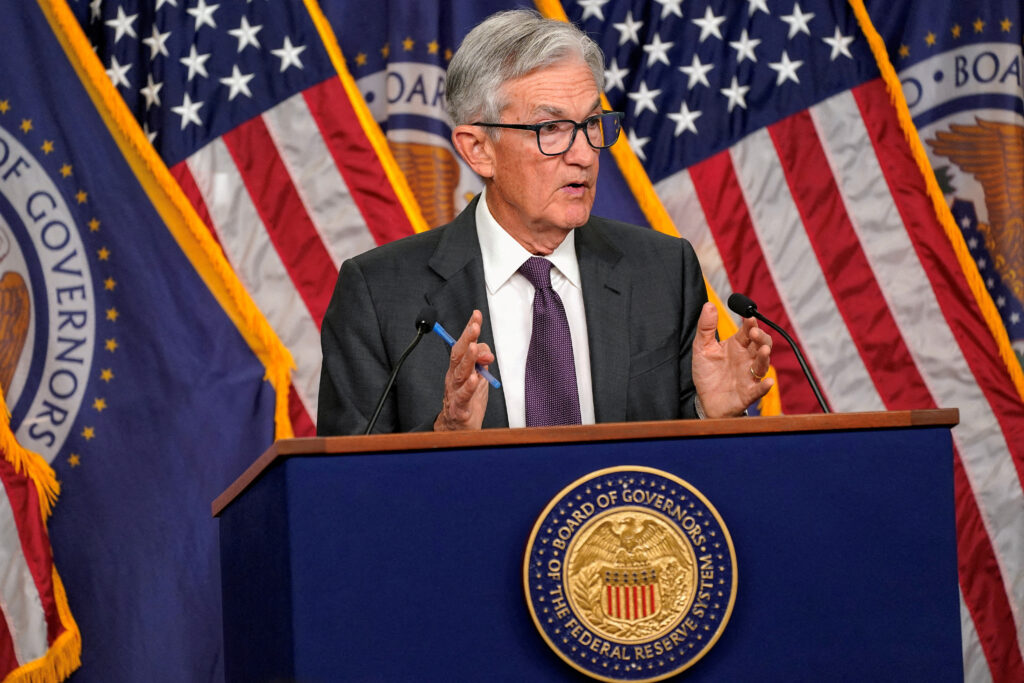

(Reuters)
The ripple effects of Donald Trump’s global trade war are increasingly being felt across numerous industries all at once and on Wednesday (April 16) were once again exerting pressure on US stock markets that have been roiled for weeks by his erratic trade policies.
Stocks fell broadly, with tech stocks hit particularly hard after bellwethers like Nvidia that are highly tied into the world’s supply chain warned of hits to their bottom line.
Meanwhile, airlines said they are bracing for an uncertain summer travel season, and the head of the Federal Reserve noted slowing economic activity – but also cast a wary eye on the threat that tariffs pose to its goal of lowering inflation.
And though Trump has said numerous countries are lining up to make deals with the United States, the progress has been slow and uncertain. The president was set to engage personally in talks with Japan over tariffs later on Wednesday.
While the market volatility that erupted two weeks ago has ebbed, business leaders still say the uncertainty is stalling spending plans. The world’s two largest economies – the United States and China – remain in a full-blown trade war, and the status of US talks with the European Union, Canada and other countries is unclear.
“What was true yesterday is no longer true today, what will be tomorrow I do not know,” said Jean-Christophe Babin, CEO of Rome-based Bulgari, the jewellery subsidiary of luxury giant LVMH, regarding US tariff policy.
TECH SELL OFF
Tech companies were at the forefront of Wednesday’s ructions. AI chip giant Nvidia said its sales to China would cost it US$5.5 billion in accounting charges due to the administration’s curbs on AI chip exports, while ASML, the world’s biggest supplier of computer chip-making equipment, said tariffs have made the outlook for both 2025 and 2026 uncertain. Other US chip equipment makers could see a hit of about US$1 billion yearly due to the levies, industry officials told lawmakers last week.
Stocks overall slid again on Wednesday, with the tech-dominated Nasdaq Composite falling three per cent, led by a seven per cent drop in Nvidia. Fellow chipmaker Advanced Micro Devices said it would take a US$800 million hit from the administration’s curbs on sales to China.
Even more optimistic companies tempered their positivity. United Airlines maintained its profit outlook for 2025, but unusually, laid out two scenarios for the year, saying that the macro environment was “impossible to predict this year with any degree of confidence.”
Japan, the nation currently at the front of the queue in talks, was thrust into the position of having scheduled talks between economic revitalisation minister Ryosei Akazawa and US Treasury Secretary Scott Bessent turn into a meeting with Trump himself on Wednesday evening. The president said he would attend the discussions personally to cover other non-trade issues as he continues to focus on the US balance of trade with other countries.
Japan exports more than 1 million cars to the United States annually, particularly affordable models that could see their price tag rise by thousands of dollars if tariffs stay in place. Some automakers have broached moving some production to the US, but that is not an easy task.

“We need to have somewhat of a break on the tariffs for a period of time so that we can organise ourselves to localise …and bring the supplier base in the US,” Nissan Americas chairman Christian Meunier told Reuters, adding that the process takes years.
SCRAMBLING TO GET THINGS IN
Fed Chair Jerome Powell, in a speech in Chicago, noted the slowing economy but added that “inflation is likely to go up as tariffs find their way and some part of those tariffs come to be paid by the public.”
US consumer sentiment has deteriorated sharply since Trump ratcheted up the rhetoric around tariffs in mid-February.

Banking CEOs in recent days have said consumer spending has not dipped dramatically, but cracks are starting to appear. Retail sales were robust in March, largely due to the best month for auto sales since 2023, but other components in spending were softer, and service-sector spending could start to ebb as people load up on goods, worried about higher prices.
Retailers are aware of this possibility as well, as China-based discount retailers Temu and Shein encouraged shoppers to buy “now at today’s rates,” saying in nearly identical letters that they would be raising prices beginning April 25.
Spending on goods and equipment – both to and from the United States – could also face a bumpier path.
“Everybody was scrambling through the month of March to try to get things in,” said Marko Bebek, a sales manager for L.B. White, which makes hog barn equipment in the U.S. that is sold in Canada.







Comments